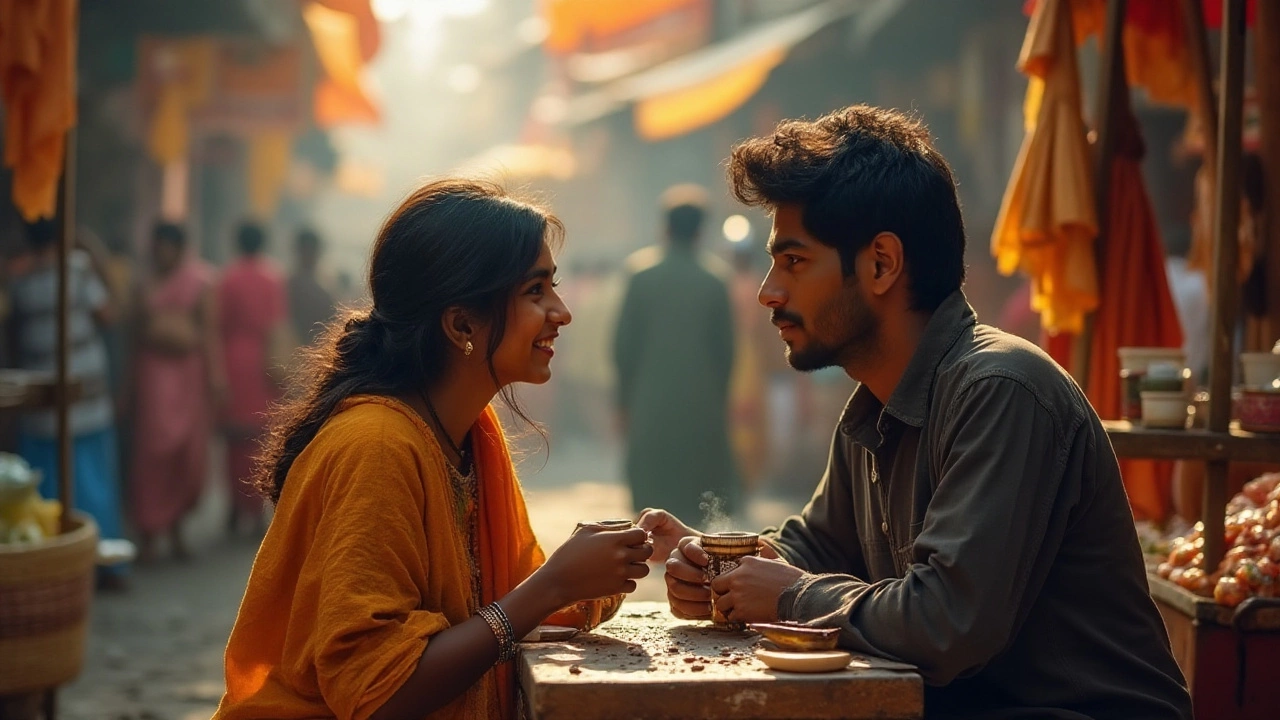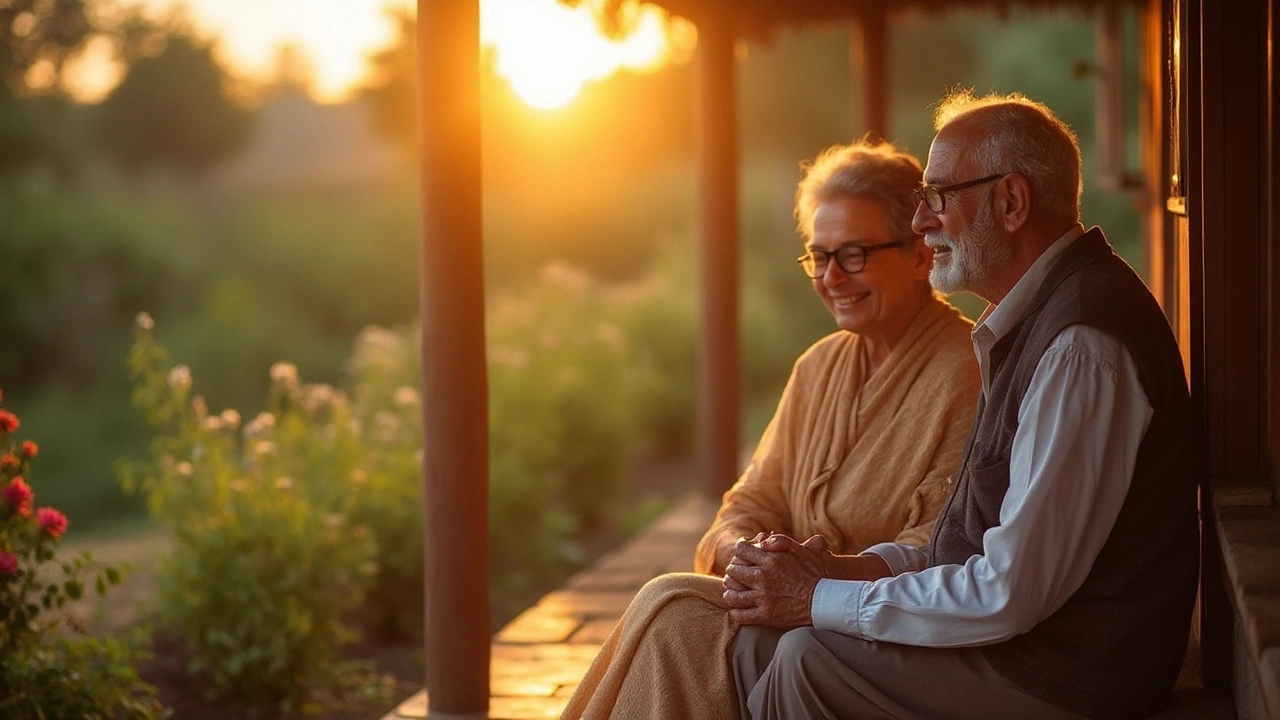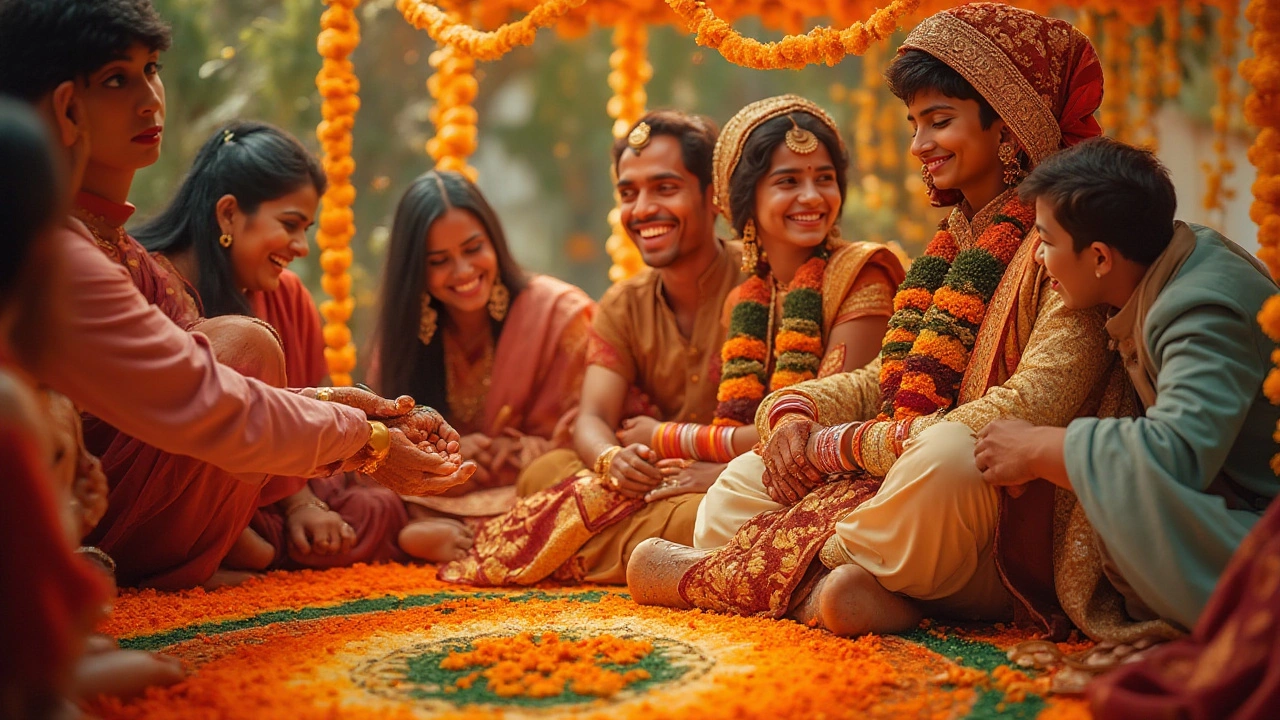What really is love? Such a question seems simple, but it unfolds into a vast array of emotions and meanings. Imagine love as a kaleidoscope of connections and emotions — each turn revealing a new perspective, a different hue. To understand love, one must embark on a journey knowing it's as much about introspection as it is about shared experiences.
In India, where emotions are vibrant and intensely felt, love transcends mere definitions, becoming a cultural and personal phenomenon. Whether it’s the quiet comfort of a shared silence or the feverish pulse of passion, love defines and defies boundaries, speaking a universal language that binds us in extraordinary ways.
- The Essence of Love
- Cultural Perspectives
- Psychological Insights
- Love’s Impact on Relationships
- Nurturing Love
The Essence of Love
To truly grasp the essence of love, we must first acknowledge its multifaceted nature. Love is not a single emotion but a symphony of feelings that harmonize to create profound connections between individuals. This complex blend involves elements of compassion, desire, trust, and commitment, blending together to create a bond that transcends time and space. Whether it manifests as a mother's gentle care or the intimacy shared between lifelong partners, love encompasses a range of expressions that speak volumes about its depth and breadth.
Scientific research suggests that love activates the same neural pathways in the brain as reward-based behaviors, indicating that our brains are hardwired to seek and revel in love's embrace. A study published by Dr. Helen Fisher, a renowned biological anthropologist, highlights how love triggers a dopamine high similar to that experienced by someone on a stimulating substance. This revelation helps us understand why people often describe feeling 'high on love.' The chemistry behind love is not only fascinating but also emphasizes our intrinsic need for connection and acceptance.
In the realm of literature and culture, love has been a central theme for centuries, guiding the narratives of epics, poems, and stories across the globe. In India, love stories like that of Radha and Krishna or the historical saga of Mumtaz and Shah Jahan, showcase the cultural significance of emotional bonds. These tales emphasize how love is not just a personal experience but also a cultural expression that reflects the values and traditions of a society.
"Love looks not with the eyes, but with the mind, and therefore is winged Cupid painted blind," observed William Shakespeare, eloquently capturing love’s transcendental nature.
Philosophically, love challenges us to be our best selves, fostering a sense of altruism and empathy. The act of loving and being loved provides us with purpose and meaning that goes beyond ourselves. It is not merely a transaction of feelings but a profound state of being that encourages personal growth and understanding. This transformative potential is especially significant in intimate relationships, where love acts as the foundation for mutual respect and collective aspirations.
Love's endurance is also noteworthy. While the initial spark might be attributed to attraction, long-lasting love withstands the trials of time through patience and understanding. In romantic relationships, for instance, maintaining love requires effort and compromise, marking a stark distinction between cinematic depictions versus real-life dynamics. Love in its truest form is less about grand gestures and more about shared moments of support, laughter, and companionship.
Cultural Perspectives
Love, as viewed through the lens of Indian culture, is a fascinating mosaic of traditions, rituals, and deeply ingrained societal values. The concept of love in India transcends the simplistic notions often seen in Western cultures, embodying a rich tapestry that includes family expectations, historical tales, and spiritual dimensions. Indian love stories, from the timeless epic of Ramayana to the poignant verses of medieval poets like Mirza Ghalib, offer a glimpse into a society where love is both celebrated and revered. Love is not just between two souls but often involves families and communities, creating a shared experience that is larger than life.
Arranged marriages, a common practice in Indian culture, are a testament to how love and tradition intertwine. Here, love is not always instantaneous but grows through shared experiences and familial bonds. The idea that love can be nurtured after marriage, rather than the Western notions of love as a precursor to marriage, highlights a different approach. Though modern Indian society increasingly embraces love marriages, the traditional perspectives still hold significant sway. This dual cultural dynamic provides a vibrant context where love can flourish in myriad forms, reflecting both individual desires and collective familial responsibilities.
Festivals like Valentine's Day have found their place alongside traditional celebrations such as Karva Chauth or Teej, all depicting love in varied forms and contexts. The juxtaposition of new and old beliefs in India creates a unique environment where expressions of love can be both personal and profoundly cultural. These festivals symbolize an eternal bond, where fasting and prayer are used to strengthen marital ties. Love in India is frequently described using poetic imagery, affirming its place as something divine and transcendental. As quoted by Rabindranath Tagore, "Love is not a mere impulse, it must contain truth, which is law." This blend of spirituality and emotion underscores the pervasive influence of love in Indian cultural heritage.
In media, Bollywood plays a crucial role in shaping perceptions of love. The silver screen portrays love as a majestic and, at times, tumultuous journey, echoing societal changes and aspirations. Films like "Dilwale Dulhania Le Jayenge" have defined generations, instilling a belief in the power of love to overcome obstacles. These narratives capture the imagination and heart, setting trends that often ripple through society, affecting how love is perceived and pursued. The depiction of love in Bollywood reflects both contemporary attitudes and traditional virtues, creating a harmonious blend where the past meets the present.

Psychological Insights
One of the most intriguing aspects of love is how it finds roots in the deep trenches of our psyche. It is more than just a mere feeling; it's an experience that engages our mind and senses, creating a bond that surpasses ordinary connections. Psychologists have long pondered the nature of love, trying to decipher its impact on human behavior and decision-making. They have found that love can activate regions in the brain associated with reward, creating a sensation of euphoria and contentment akin to an addictive substance. This is why people often describe falling in love as something they can't quite control. From a psychological standpoint, love fuels our desires, drives us towards attachment, and significantly affects how we perceive the world around us.
Recent studies have identified that love can influence cognitive processes, enhancing creativity, problem-solving abilities, and motivating altruistic behavior. This seems particularly evident in times of challenge or stress, where individuals often draw upon their experiences of love for strength and perseverance. The famous psychologist Robert Sternberg introduced the triangular theory of love, illustrating love's complexity through three core components: intimacy, passion, and commitment. According to his theory, these components, in varying combinations, explain different types of love relationships—from the passionate romances to the enduring bonds of friendship.
"Love is the only reality, and it is not a mere sentiment. It is the ultimate truth that lies at the heart of creation," said Rabindranath Tagore, subtly highlighting how intrinsic and fundamental love is to our existence.
In this exploration, it's crucial to consider how cultural contexts, such as those in India, play a role in shaping our understanding of love. Cultural norms and traditions can affect the expression and acceptance of love, with arranged marriages, family expectations, and societal values forming a unique backdrop to romantic affairs. In a country where the tapestry of relationships is ever-dynamic, psychological aspects of love are often intertwined with cultural narratives. For many, love in India represents a balance of individual desires and collective expectations. Thus, understanding love from a psychological angle involves recognizing how deeply it interweaves with our identities, beliefs, and emotional landscapes.
Love’s Impact on Relationships
Love is an influential force that can profoundly shape our lives and how we interact with those around us. This power of love can be so strong that it redefines our relationships, often in unexpected ways. Within a relationship, love acts as a binding thread, weaving together shared experiences, challenges, and joys into a richer tapestry of life. It is love that often gives us the patience to understand, the courage to forgive, and the strength to support our partners through life's myriad challenges. Without this emotional connection, relationships may struggle to develop the necessary resilience to withstand life's inevitable ups and downs.
For many, the way love amplifies emotional bonds can be transformative. It nurtures empathy, allowing partners to step into each other's shoes and see the world through another lens. Relationships grounded in love often witness improved communication because the motivation to understand and connect is stronger. A well-known psychologist, Dr. John Gottman, suggests that love enhances relationship satisfaction because it fosters a sense of mutual respect and admiration. As couples learn to express love, they also become more attuned to each other's needs, creating a nurturing environment that is paramount for growth and stability.
Interestingly, love can also be seen as a great teacher, offering lessons in vulnerability and trust. Establishing deep emotional connections often entails exposing one's inner self, which can be daunting yet rewarding. Indian culture, steeped in traditional values and family ties, frequently highlights how love influences choices related to companionship and marriage. For instance, arranged marriages, despite their seemingly pragmatic beginnings, often evolve into loving and fulfilling partnerships because of the diligence both partners invest into nurturing love. This cultural component underscores love's adaptability and resilience as it weaves into different relationship dynamics.
"Love does not consist in gazing at each other, but in looking outward together in the same direction." – Antoine de Saint-ExupéryNotably, love’s impact extends beyond just romantic relationships. It finds its place in friendships, family bonds, and communal connections. In each scenario, love is the common denominator that encourages selflessness and loyalty. A shared love for art, philosophy, or a sports team can bring people together, showcasing that love is versatile, transcending simply romantic notions. Researchers have found that cultures that promote love and empathy typically have stronger, more cohesive communities.
For those looking to strengthen their own relationships through love, there are several approaches that can be taken. Start with small gestures that show appreciation, as recognition of effort often boosts emotional bonds. Engaging in open, honest discussions about one’s feelings and expectations can clear misunderstandings and solidify trust. Sharing activities that partners enjoy can further enhance companionship. Keeping a balance between independence and togetherness can also ensure that while you grow as a couple, individual passions and interests are not overshadowed. Through these simple yet effective gestures, love perpetually influences relationships for the better.

Nurturing Love
Nurturing love is akin to tending to a delicate garden; it requires attention, patience, and intentional effort. In the fast-paced modern world, where distractions are abundant and time often feels fleeting, cultivating a lasting bond calls for understanding what truly matters in a relationship. One must realize that love is more of a verb than a noun; it’s about actionable ways of caring and supporting each other every day. Often, love grows in the quiet, unspectacular moments—late-night conversations, shared meals, or even just a knowing glance across the room.
Creating a culture of communication is crucial in nurturing any relationship. Communication isn't solely about expressing oneself but also about listening—really listening with the intent to understand, not just to respond. According to renowned psychologist John Gottman, successful couples maintain a ratio of five positive interactions for every negative one. This statistical insight suggests that for love to thrive, it must be constantly fed with support, understanding, and affirmation.
In an Indian context, the societal and familial structures play a significant role in shaping how love is expressed and nurtured. Family traditions often emphasize respect and unity, creating a foundation where love can firmly root itself. Celebrating small milestones together or engaging in cultural traditions can deepen the bond and bring about a sense of belonging. Recognizing and appreciating these familial influences can enhance the strength and depth of a romantic relationship.
"Love is not about how many days, months, or years you have been together. Love is about how much you love each other every single day," says Anurag Prakash Ray, an influential thinker on human relationships.
An essential aspect of nurturing love is resilience—the ability to navigate and overcome challenges together. Relationship experts emphasize the importance of conflict resolution skills. The ability to approach disagreements with empathy and openness rather than defensiveness can distinguish a resilient, nurturing relationship from one that falters. Couples who prioritize this emotional fortitude often find they grow closer even amid adversity.
Finally, maintaining an element of surprise and novelty can invigorate any relationship. Trying new activities together or revisiting special places from the early days of a relationship can rekindle excitement and attachment. Whether it’s through travel, cooking a new dish, or picking up a hobby together, introducing variety can enhance intimacy, making the journey loving and exciting.
